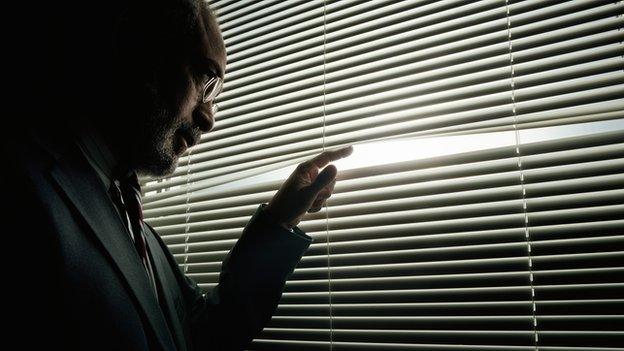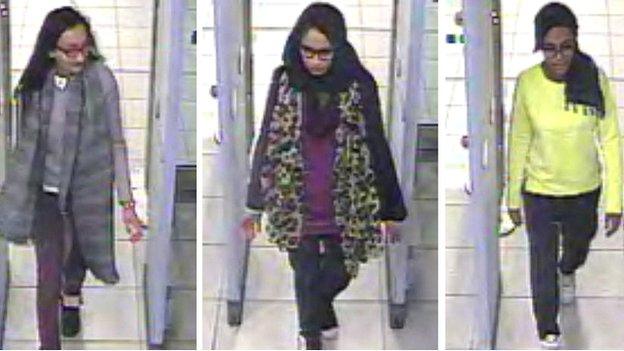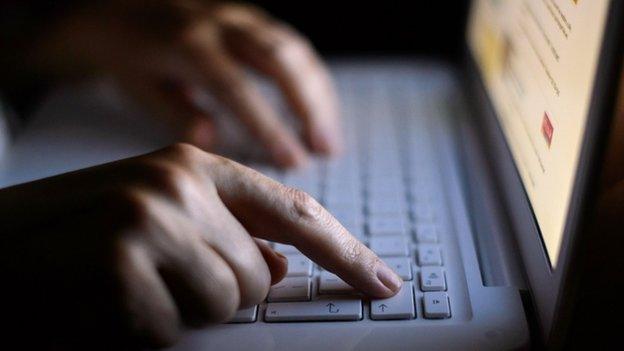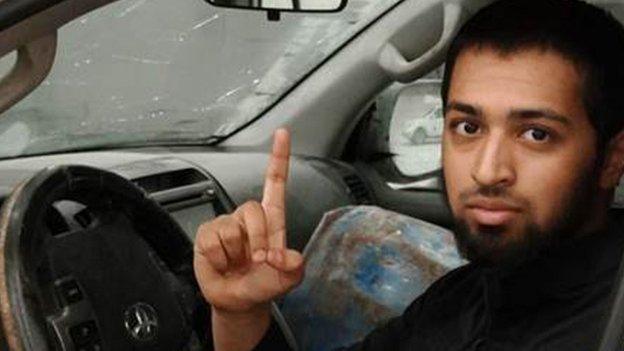Schools put on front line against extremism
- Published

Head teachers are divided about their role in countering extremism
How do you stop extremism among young people? How do you challenge the ideology that encourages teenagers to ghost themselves away from Yorkshire or London into war zones in Syria and Iraq?
From the beginning of next month, head teachers will be expected to play a much bigger part in providing answers.
The Counter-Terrorism and Security Act 2015, coming into force on 1 July, puts a statutory duty on schools to "prevent people from being drawn into terrorism".
It specifies: "Being drawn into terrorism includes not just violent extremism but also non-violent extremism, which can create an atmosphere conducive to terrorism and can popularise views which terrorists exploit."
School leaders will have to make an assessment of "the risk of children being drawn into terrorism".
There will be training for staff to identify children at risk and "to challenge extremist ideas".
Schools will have to ensure that pupils do not access extremist material online.
'Twisted narrative'
"We must consistently challenge the twisted narrative that has seduced some of our vulnerable young people," says a spokeswoman for the Home Office.
"Schools have a vital role to play in protecting pupils and we are working on projects with teachers to build understanding of how young people are radicalised."
But there have been divided responses from schools about these new responsibilities.

Schools will have a responsibility to assess the risk of children being drawn into extremism
Brian Lightman, leader of the ASCL head teachers' union, is broadly supportive, saying that the "threat posed by radicalisation and extremism is severe" and schools "have an important role to play as part of a society-wide effort".
He rejects the idea that this is about "spying on children" - but he warns that schools still have too little information about the practical implications of these "very serious additional responsibilities".
Other head teachers are distinctly lukewarm.
Russell Hobby, leader of the National Association of Head Teachers, says "schools are not experts in this field, they are not part of our security apparatus - in fact their relationship with families depends on their not being part of it".
"They cannot police our borders or monitor the internet at large."
And they will worry about whether they are meant to be carrying out "some kind of active surveillance on pupils at risk", says Mr Hobby.
'British values'
But this isn't optional. As the Home Office says: "If schools fail to meet this duty the secretary of state will have the power to force them to take action."
The new counter-extremism requirements will apply to all schools, primary and nursery as well as secondary, in village schools as well as inner-city comprehensives.

Schools will have a duty to prevent pupils having access to extremist material online
Karen Giles, head teacher of Barham primary school in Wembley, north-west London, already has to navigate the different values and beliefs of parents.
The school's intake is a mix of nationalities and religions. As with all schools now, there is a requirement to teach "British values", but in this school there isn't a single pupil classified as "white British".
She says there have been cases where Muslim parents have not wanted a child to take part in music or arts lessons. There have also been objections to children visiting the places of worship of other people's faiths.
But she says such requests have been refused - the school requires the delivery of the national curriculum and it does not allow families to pick and choose which parts they participate in.
It's an educational imperative that is observed, rather than a political one.
Ms Giles also says that it is a mistake to see such issues in stereotypical terms. There is no single "Muslim" perspective. Families might share a religion, but when they are from North Africa, Somalia or Pakistan, there can be very different cultural interpretations.
She says they use the Imams Online website to show different views on issues such as children fasting.
The aim for the school, she says, is to make sure that pupils feel comfortable and confident in their own culture, but also able to understand and respect other people's views.
Extremism or strong views?
It also raises the question about what "extremism" means in the context of a school.
How is it distinguished from narrow-mindedness or religious dogmatism? Are all forms of prejudice to be treated as extremism? When does a strongly-held personal view become "non-violent extremism"?

Talha Asmal, a teenager from Dewsbury, became a suicide bomber in Iraq
This is difficult territory.
In the background are the stories of teenagers disappearing into Syria and Iraq, rows of young faces looking back enigmatically from news pages.
But how can schools apply risk assessments without making Muslim families feel like they are being put under suspicion?
There have been warnings from the National Union of Teachers that staff will be afraid of allowing pupils to talk about controversial subjects, which would undermine free speech rather than defend it.
"Responding to extremism, including the messages from the far right, requires a coherent education system where schools can ask for support and share strategies for teaching about democracy and about human rights," says the union's leader Christine Blower.
The Department for Education says the regulations are about teachers using their "professional judgement" and acting "proportionately".
"This doesn't and shouldn't stop schools from discussing controversial issues - and will give pupils a safe space to develop the knowledge to challenge extremist beliefs and ideologies."
Big questions
The question of extremism was brought into focus by the Trojan Horse allegations in Birmingham, over claims that groups were trying to impose a hardline Muslim ethos on schools.

Schools are competing with information being sent from around the world
But there are entirely polarised views of what lessons should be drawn from this.
There are some who argue that this wasn't about extremism at all, but the result of an academy system which outsources control of schools without any adequate oversight.
But there are other head teachers who will take you aside and say this was the tip of an iceberg and the problems remain in other cities with school staff still left vulnerable.
There are other heads who suggest that the calls for early-warnings about radicalisation are counter-productive, with parents telling their children to say nothing about any suspicions, because of the fear of an over-reaction from the authorities.
As education is brought into counter-extremism, it raises some big questions about what really works.
How much can schools influence young people, compared with the powerful voices on the internet or among their friends? And what arguments will resonate with young people who feel that their religion is being stigmatised?
Wouldn't it be better to have more Muslim schools within the state sector, regulated and with clear boundaries?
This is part of a global conversation too, in a way not really been seen before. The head teachers' speech in an assembly hall is competing with information and propaganda on social media from all around the world.
The internet links the playground and the children's bedroom directly to events in war zones in the Middle East. It's a battle for hearts, minds and mobiles.
Who is going to be the most persuasive?